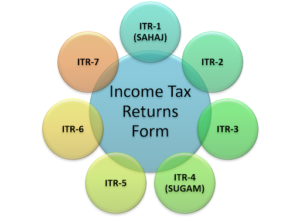What is an Income Tax Return?
An Income Tax Return (ITR) is a form used by individuals and entities to report their income to the Income Tax Department. It includes information about income from various sources, deductions claimed, and taxes paid during the financial year.
Key Features of Income Tax Return
- Mandatory Filing: Taxpayers must file an ITR if their income exceeds the basic exemption limit.
- Different Forms: The ITR form varies based on the taxpayer’s income source and status (individual, company, firm, etc.).
- Income Reporting: The form provides details of income earned, tax deductions, and tax payments made.
- Refund Claims: Filing allows taxpayers to claim tax refunds if excess taxes have been paid during the year.
Who Should File an Income Tax Return in India?
- Individuals: Those whose total income exceeds the exemption limit (INR 2.5 lakh for individuals below 60 years) must file an ITR.
- Businesses & Firms: All registered companies, firms, and LLPs must file ITR, irrespective of profit or loss.
- Trusts & Associations: Charitable institutions, NGOs, and other entities with income above the exemption limit are required to file.
Types of Income Tax Return Forms
- ITR-1 (SAHAJ): For salaried individuals, pensioners, or those with one house property.
- ITR-2: For individuals and HUFs not earning from business or profession.
- ITR-3: For individuals and HUFs with income from business or profession.
- ITR-4 (SUGAM): For taxpayers opting for presumptive taxation.
- ITR-5: For LLPs, AOPs, and BOIs.
- ITR-6: For companies not claiming exemption under Section 11.
- ITR-7: For trusts, political parties, and other entities under specified sections.
Benefits of Filing an Income Tax Return
- Legal Compliance: Filing ensures adherence to legal requirements, avoiding penalties or fines.
- Claim Refunds: If excess tax has been paid, filing ITR helps claim refunds.
- Financial Transparency: Establishes a clear record of income, helping in securing loans or visas.
- Tax Deductions: Claim eligible deductions under sections like 80C, 80D, etc., to reduce tax liability.
- Building Financial History: A consistent record of ITR filings boosts credibility for future financial applications.
- Contributes to Nation Building: Taxes help fund public infrastructure, education, healthcare, and welfare programs.
Documents Required for ITR Filing
- PAN Card: A unique identification number required for tax filing.
- Aadhaar Card: Must be linked with PAN for ITR filing.
- Form 16: Issued by the employer, detailing salary, allowances, and tax deducted.
- Form 26AS: Consolidated tax statement showing TDS details.
- Bank Statements: To verify income, interest, and expenses.
- Investment Proofs: For claiming deductions (PPF, life insurance, etc.).
- Property Documents: For claiming home loan deductions.
- Rent Receipts: For claiming House Rent Allowance (HRA).
- Other Documents: Receipts for donations, medical bills, etc., for additional deductions.
What is an Income Tax Return?
An Income Tax Return (ITR) is a form used by individuals and entities to report their income to the Income Tax Department. It includes information about income from various sources, deductions claimed, and taxes paid during the financial year.
Key Features of Income Tax Return
- Mandatory Filing: Taxpayers must file an ITR if their income exceeds the basic exemption limit.
- Different Forms: The ITR form varies based on the taxpayer’s income source and status (individual, company, firm, etc.).
- Income Reporting: The form provides details of income earned, tax deductions, and tax payments made.
- Refund Claims: Filing allows taxpayers to claim tax refunds if excess taxes have been paid during the year.
Who Should File an Income Tax Return in India?
- Individuals: Those whose total income exceeds the exemption limit (INR 2.5 lakh for individuals below 60 years) must file an ITR.
- Businesses & Firms: All registered companies, firms, and LLPs must file ITR, irrespective of profit or loss.
- Trusts & Associations: Charitable institutions, NGOs, and other entities with income above the exemption limit are required to file.
Types of Income Tax Return Forms
- ITR-1 (SAHAJ): For salaried individuals, pensioners, or those with one house property.
- ITR-2: For individuals and HUFs not earning from business or profession.
- ITR-3: For individuals and HUFs with income from business or profession.
- ITR-4 (SUGAM): For taxpayers opting for presumptive taxation.
- ITR-5: For LLPs, AOPs, and BOIs.
- ITR-6: For companies not claiming exemption under Section 11.
- ITR-7: For trusts, political parties, and other entities under specified sections.
Benefits of Filing an Income Tax Return
- Legal Compliance: Filing ensures adherence to legal requirements, avoiding penalties or fines.
- Claim Refunds: If excess tax has been paid, filing ITR helps claim refunds.
- Financial Transparency: Establishes a clear record of income, helping in securing loans or visas.
- Tax Deductions: Claim eligible deductions under sections like 80C, 80D, etc., to reduce tax liability.
- Building Financial History: A consistent record of ITR filings boosts credibility for future financial applications.
- Contributes to Nation Building: Taxes help fund public infrastructure, education, healthcare, and welfare programs.
Documents Required for ITR Filing
- PAN Card: A unique identification number required for tax filing.
- Aadhaar Card: Must be linked with PAN for ITR filing.
- Form 16: Issued by the employer, detailing salary, allowances, and tax deducted.
- Form 26AS: Consolidated tax statement showing TDS details.
- Bank Statements: To verify income, interest, and expenses.
- Investment Proofs: For claiming deductions (PPF, life insurance, etc.).
- Property Documents: For claiming home loan deductions.
- Rent Receipts: For claiming House Rent Allowance (HRA).
- Other Documents: Receipts for donations, medical bills, etc., for additional deductions.



